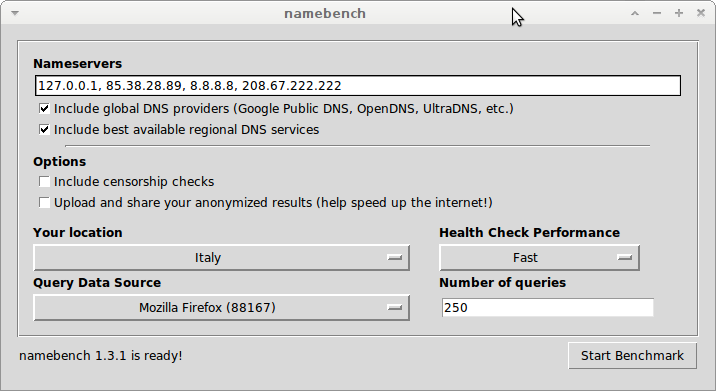In a former article (1 year ago) i used a java tool to see which DNS was faster among Google, OpenDNS and my local ISP, and the winner it’s been my local ISP; but I’ve recently discovered another nice tool that can do these tests, so today I want to re-check these 3 DNS servers with namebench
Namebench it’s a small program wrote in python that search for the fastest DNS server near to you.
Namebench runs a fair and thorough benchmark using your web browser history, tcpdump output, or standardized datasets (top 2000 Alexa) in order to provide an individualized recommendation. namebench is completely free and does not modify your system in any way. The project began as a 20% project at Google.
namebench runs on Mac OS X, Windows, and UNIX, and is available with a graphical user interface as well as a command-line interface.
Installation
The source are available on the official site, as wrote this is a python program so you should be able to run it from the command line without any additional package, if you want also the GUI you need also the package python-tk, this is usually available in all the main repositories of the principal distributions.
On Ubuntu 11.04 this package it’s available, so you can install it with these commands:
root~# aptitude install namebench The following NEW packages will be installed: blt{a} namebench python-dnspython{a} python-graphy{a} python-jinja2{a} python-tk{a} tk8.5{a} 0 packages upgraded, 7 newly installed, 0 to remove and 0 not upgraded. Need to get 3,234 kB of archives. After unpacking 11.1 MB will be used. |
Or if you prefer from the Ubuntu Software center
Basic usage
Write in a terminal: namebench and the main (and only) windows will appears:

Under Nameservers there are your current DNS server taken from your configuration file.
In Query Data Source you can choose where to take the DNS names to be tested, from your browser history, Top 2000 Alexa sites or do other latency tests.
Once you have selected your options just click on Start Benchmark and wait, it took around 10 minutes on my computer to run all the the tests.
At the end you’ll have a page with all the results and some nice graphs, but now you are interested at the information at the top:

On the left you can see an estimation of how much you can gain in using the DNS server listed on the right side.
Modify your configuration
Now that you know which DNS server to use you just need to change 1 file.
on a terminal write gksudo gedit /etc/resolv.conf, in this example i’ve used gedit, you can put there your favourite text editor there
such as vi, emacs or mousepad.
In this file put the same IP address you have got as result of your benchmark, something like:
nameserver 127.0.0.1 nameserver 8.8.8.8 nameserver 85.37.17.40 nameserver 208.67.222.222 |
You are done, this change don’t require any restart. So you are using the new configuration in the moment you save this file, happy browsing.
Popular Posts:
- None Found

[…] Open source Namebench – DNS server benchmark September 24, 2011 No Comments » Linuxaria – Everything about GNU/Linux and Open source Namebench – DNS server benchmark. […]
Once launched from a shell xterm, namebench opens the GUI but continues to announce details on the STDOUT and STDERR of the controlling xterm. This two-headed interface might present troubles for some folks.
Other than look-pretty issues, this is a solid utility that offers a lot of value.
Cheers,
~~~ 0;-Dan
usando questo programma e usando i dns proposti ho riscontrato una peggiore connessione